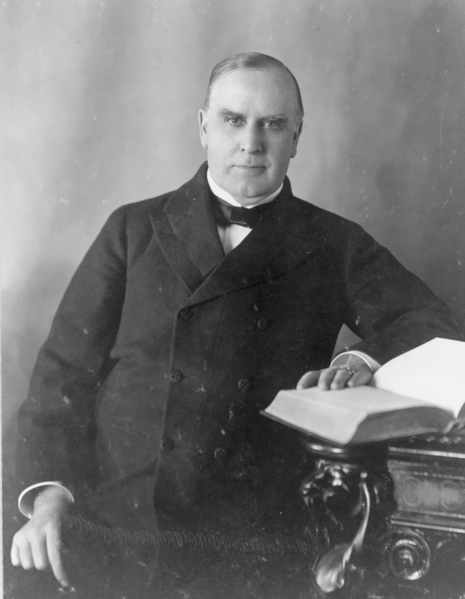Vain
William McKinley boasted brawny built, broad shoulders, big chest, though, through the years, he developed a potbelly. He stood 5 feet and 7 inches tall and weighed up to almost 200 pounds. William was generally a handsome man. He had fair skin, deep blue-eye gray eyes highlighted by his bristly eyebrows, a relatively large nose, and a prominent jaw accentuated by a cleft chin.
Being exposed in the Army, William developed a clear, loud voice, a dignified posture, and walked very briskly. When it comes to clothing, he loved to dress conservatively, mostly in a white vest. William declines to be photographed if he hasn’t been well-groomed. During campaigns, William always sported a red carnation he places on his buttonhole, sighting good luck. It became his insignia, which made the legislation in Ohio declare the scarlet carnation as their official state flower. William was generally healthy throughout his life, except for the illness that struck him during college, which can be attributed to overwork.
Industrious
William was brimmed with much drive and determination. He was a hard worker and studied very well. After finishing high school, William went to Allegheny College in Meadville, Pennsylvania. While he had to stop his studies due to an unfortunate illness and the dire finances of his family, it never let him give up. William doesn’t allow anyone or anything to stand in his way in achieving his goals. After he recovered, he immediately worked as a postal clerk and then as a school teacher in line with his aspirations to continue his studies.
A Leader
William was a born leader who loved to be at the forefront and limelight. When the Civil War commenced, William became part of the 23rd Ohio Volunteer Infantry. He was only 18 years old then but already proved to be a stout-hearted soldier.
Gov. David Tod even retold William’s actions and bravery during the renowned Battle of Antietam. Tod said that while their army men were suffering from the lack of even something little to eat and a droplet to drink, William, along with this staff, can be seen all on parts of the battlefield, provided coffee and food, which their men rigorously needed during that time. Not only that as William encouraged everyone with his courageous and inspiring words, without seeming to mind the shots and shells that were going rapidly about him.
With those qualities, William worked his way up from the lower ranks. He ended his stint with the Army as a brevet major. His qualities stood out, with his Army friend still calling him as a major even after the war had ended.
Exemplary Character
William accepts the responsibility to be a protector and provider of the people. When he joined the Congress at the age of 34, his exemplary character, charming personality, and innate wit allowed him to become renowned rapidly. He was tasked to handle the influential Ways and Means Committee. One of the people who served him, Robert M. La Follette, Sr., regarded William as an individual who represented the unconventional view, who always had the excellent new questions, and was more on the public side instead of the interests of private entities. He stayed 14 years in the House of Representatives, and established himself as the leading tariff expert of the Republican Party, naming the measure to him when it was passed in 1890.
Devoutly Religious
William was an extremely religious person. This attribute can be traced down to his conversion experience during childhood. He read and prayed the Bible daily, always attended Methodist worships, testified about his faith, and strictly followed the moral norms of the Christian faith. No doubt that he’s one of the most religious presidents in American history. He ardently supported various missions, acknowledging that God was responsible for history and even his own life. During his presidency, he occasionally sought after the guidance of God in making his decisions and creating his policies. In fact, his decision to be in war with Spain and take control of the Philippines in 1898 was backed up by his immense faith. Most religious leaders at that time were supportive of William’s actions towards the Philippines, Cuba, and Spain. However, he was still criticized by many for not being able to separate patriotism and devotion, and for claiming that the said decisions lived up to God’s expectations. When he was assassinated, it resulted in an efflux of spiritual reflection, religious agony, and admiration for his Christian belief and devotion.
Peculiar
But, all-in-all, William’s personality was certainly peculiar. He was friendly, open, cheerful, and well-liked. He was more than famous during his time, and even his critics were fond of his charming personality. Some people also cited that his fairness and courtesy received admirations both from Democrats and the Republicans. Moreover, the public liked him because William was genuine and didn’t hide any emotion. He was well-liked of the people regardless of status. No wonder he enjoyed having people around. While he was not a great storyteller and had dry humor, he laughed at fun, clean jokes but rose if needed for any unnecessary remarks.
US Presidents | ||

